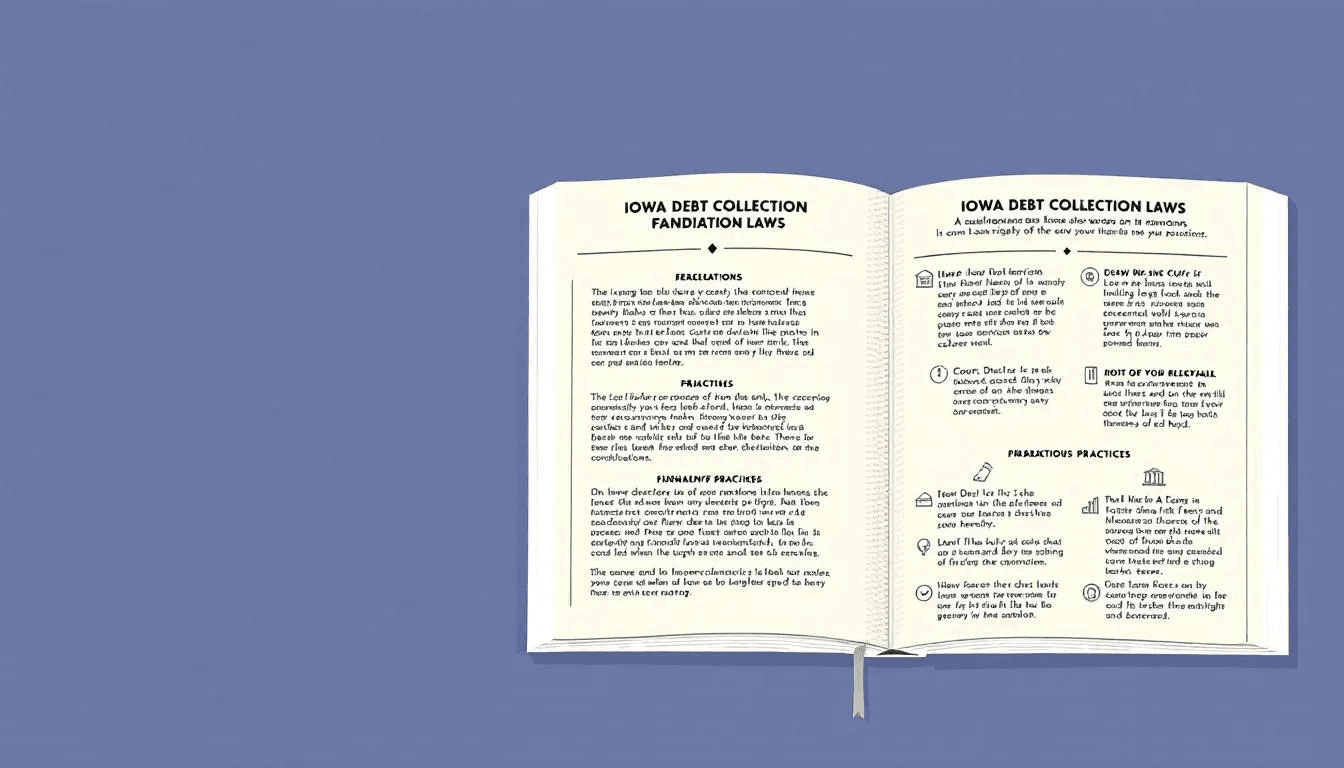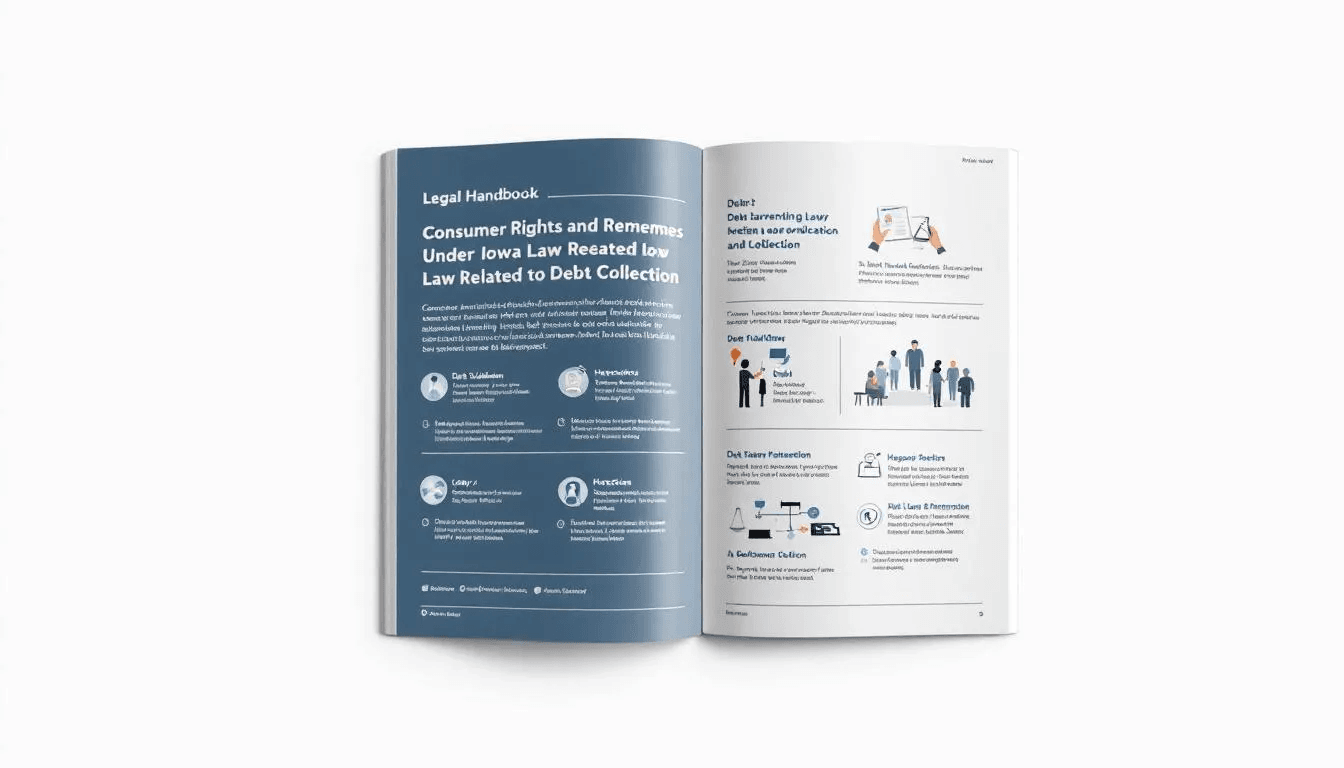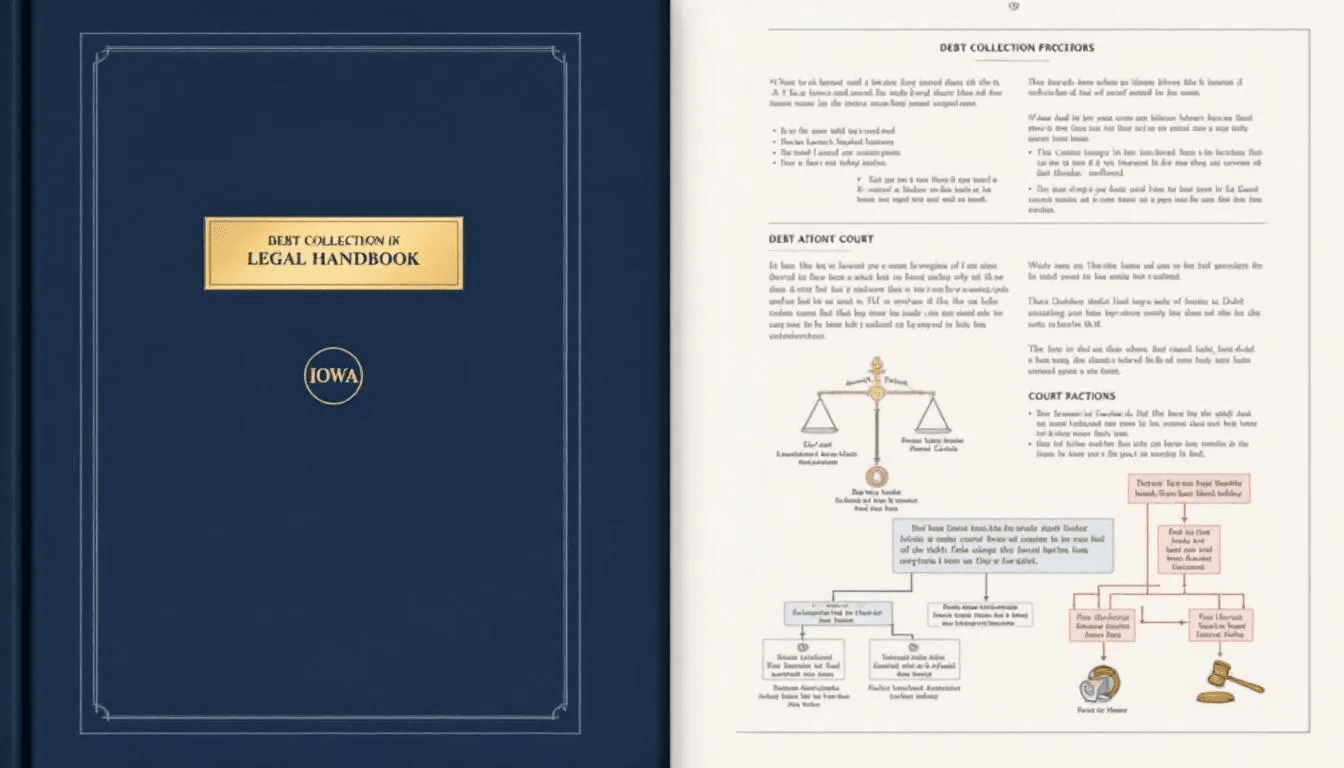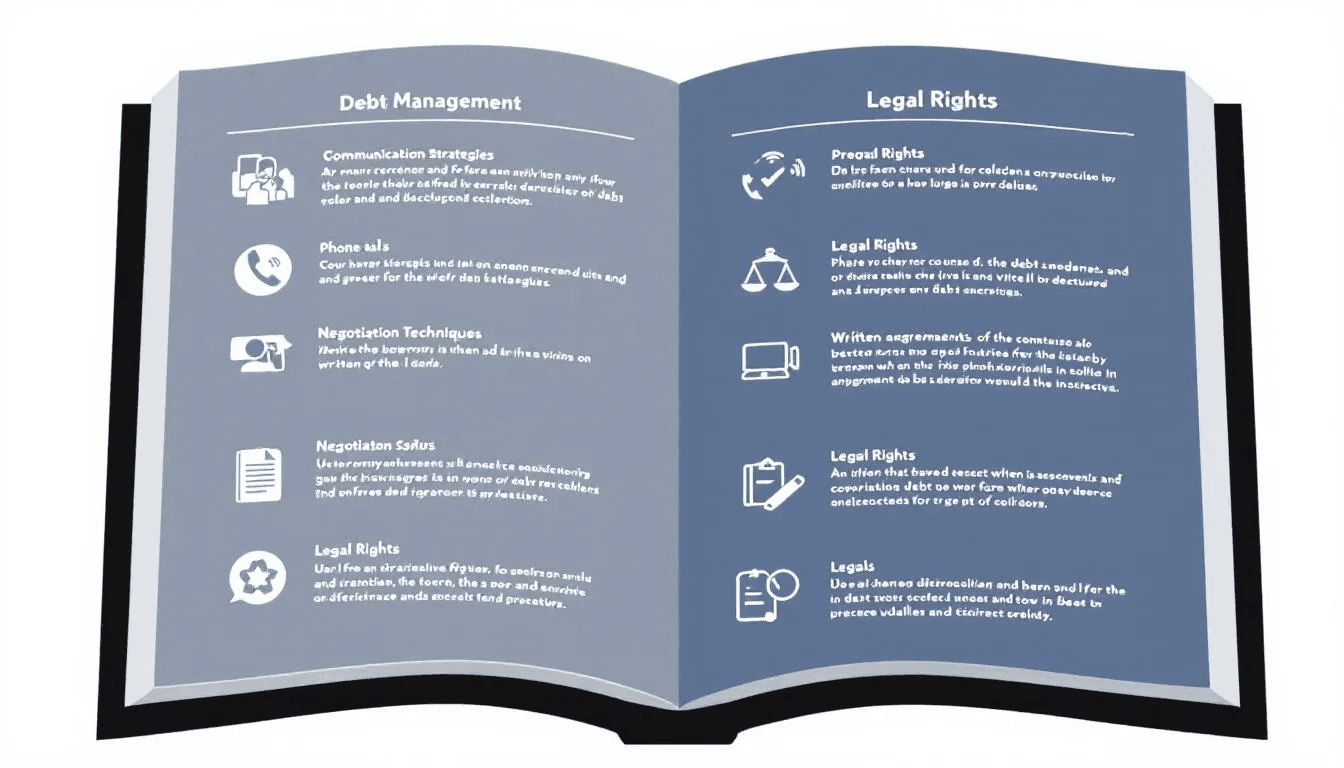Iowa debt collection laws protect you from abusive debt collection practices. This article explains your rights and shows how you can ensure debt collectors follow the law. Learn about prohibited practices and what you can do if your rights are violated.
Key Takeaways
- Iowa debt collection laws, particularly the Iowa Fair Debt Collection Practices Act, protect consumers from abusive, deceptive, and unlawful collection practices by regulating actions of both debt collectors and original creditors.
- Consumers have the right to request debt validation, stop unwanted contact from debt collectors, and file complaints against violations, ensuring they are informed and can effectively address illegal behaviors.
- Legal avenues are available for consumers to pursue against debt collectors who violate their rights, including the option to file lawsuits for damages and recover attorney fees, thus promoting accountability in debt collection practices.
Overview of Iowa Debt Collection Laws


Iowa debt collection laws provide essential protections for consumers against unlawful practices by debt collectors. The Iowa Fair Debt Collection Practices Act (IFDCPA) is a cornerstone of these protections, setting clear boundaries on what debt collectors can and cannot do when attempting to collect a debt. This act aims to shield consumers from abusive, deceptive, and unfair collection practices, ensuring that interactions remain respectful and lawful.
Debt collectors and creditors often take various actions to collect unpaid debts and bills, such as mailing notices, making phone calls, or pursuing legal action. However, Iowa law specifically addresses and regulates these practices to prevent harassment and intimidation.
Knowing these laws can help you recognize when a collector is overstepping boundaries and infringing on your rights.
Applicability to Debt Collectors and Creditors
Iowa debt collection laws apply to a broad spectrum of entities involved in the debt collection process. This includes not only third-party debt collectors who are hired to collect debts on behalf of others but also original creditors who are collecting their own debts. This comprehensive coverage ensures that consumers are protected regardless of who is attempting to collect the debt.
These laws also restrict how debt collectors can contact third parties about your personal debt. They cannot reach out to your relatives or employers without your consent or a court order, thus maintaining your privacy and preventing unnecessary embarrassment.
Prohibited Practices in Debt Collection
Iowa law explicitly bans harassing or abusive practices. Debt collectors cannot make excessive phone calls, particularly during early morning or late evening hours, nor can they use derogatory or intimidating language.
Iowa law also prohibits false claims about legal actions. Debt collectors cannot threaten arrest or wage garnishment without a court order, ensuring that fear and misinformation are not used to coerce payments.
Common Violations by Debt Collectors in Iowa
Despite the clear legal boundaries set by Iowa law, many debt collectors still engage in practices that violate consumers’ rights. These violations can include:
- Unauthorized communication
- Outright harassment
- False representations Recognizing these common violations enables you to address illegal behavior effectively.
Debt collectors in Iowa often cross the line by using deceptive and aggressive tactics to collect debts. Such actions not only infringe on your rights but also undermine the integrity of the debt collection process, violating the standards expected in this field. Next, we will explore specific types of violations to help you recognize and address them.
Unauthorized Communication
Debt collectors must follow strict guidelines on when they can contact consumers:
- They cannot call before 8 AM.
- They cannot call after 9 PM.
- Exceptions apply if you have explicitly permitted contact outside these hours. These rules ensure minimal disruption to your daily life during inconvenient times.
Debt collectors can only contact third parties, such as family members or employers, to locate you and must not disclose any information about your debt to any person. Key points include:
- They can contact third parties only to locate you.
- They must not disclose any information about your debt to third parties.
- If you request that they stop contacting third parties, they must comply.
Harassment and Abuse
Iowa law offers robust protections against harassment and abuse by debt collectors. It is illegal for debt collectors to use threats of violence or other intimidating tactics to collect a debt. Repeated phone calls, especially those intended to annoy or intimidate, are also classified as harassment under Iowa law.
Harassment examples include incessant phone calls, threats of arrest, and obscene language. These behaviors are illegal, and consumers can take action against debt collectors who harass them.
False Representations
Debt collectors often resort to false representations to intimidate consumers into paying debts. For example, they might falsely claim that legal action is imminent when it is not, or that nonpayment will result in arrest or the loss of government benefits. These misleading claims are designed to create a sense of urgency and fear, as they are represented to consumers in a threatening and deceptive manner.
Some debt collectors send documents resembling official court papers to trick consumers into believing immediate legal action is being taken. Such deceptive tactics are prohibited under Iowa law, and consumers can seek legal recourse against them.
Consumer Rights and Remedies Under Iowa Law


Consumers in Iowa are endowed with specific rights and remedies to protect them from unlawful debt collection practices. These legal protections ensure fairness and transparency in the debt collection process. Understanding your rights allows you to defend yourself against violations effectively.
Requesting debt validation is a powerful tool that ensures claims made by debt collectors are backed by legitimate documentation. Additionally, Iowa law offers mechanisms to stop unwanted contact and file complaints against violators, providing robust consumer protection.
Right to Request Validation of Debts
Consumers can request debt validation before making any payments. This means demanding proof that the debt is legitimate and that the collector has the right to collect it. Always request written verification to keep clear records of all interactions.
This right is particularly important when dealing with old debts or debts that you do not recognize. By demanding validation, you ensure that you are only paying debts that are legally and accurately attributed to you.
Stopping Unwanted Contact
If harassed by constant phone calls, Iowa law allows you to request that debt collectors stop contacting you. When writing a letter to request that they cease all communication, include the following points:
- Clearly state your name and contact information.
- Specify that you are requesting the debt collector to cease all communication with you.
- Reference Iowa law that requires them to comply with your request.
- Request confirmation in writing that they will stop contacting you.
- Keep a copy of the letter for your records.
They are legally required to comply with your request once they write the letter.
This provision helps regain peace of mind and prevent further harassment, allowing you to control communication frequency and manner with debt collectors.
Filing Complaints and Seeking Damages
Consumers experiencing violations of Iowa debt collection laws can file complaints with the Iowa Attorney General’s office online or via a downloadable form. Filing a complaint addresses your issue and helps hold debt collectors accountable.
If a debt collector violates the Iowa Fair Debt Collection Practices Act, you may be entitled to up to $1,000 in compensation plus attorney fees. This legal recourse deters unlawful practices and provides a means for seeking justice.
Legal Actions and Court Procedures


Consumers in Iowa can take legal action or court action against debt collectors for unlawful practices, including filing lawsuits, pursuing garnishment proceedings, or participating in debtor’s exams. Understanding the legal landscape and court procedures helps navigate these options effectively.
Iowa law offers a structured process for addressing and resolving disputes with debt collectors, whether filing a formal complaint or seeking a court judgment. Familiarizing yourself with these procedures helps protect your rights and achieve favorable outcomes through Iowa legal aid.
Filing a Lawsuit Against Debt Collectors
You can file a lawsuit against a debt collector if they violate your rights under Iowa law, potentially resulting in damages and reimbursement for legal fees if you win in court. This formal action addresses grievances and holds debt collectors accountable.
Victims of debt collection violations can recover statutory amounts plus attorney fees, incentivizing legal action and ensuring consumers have resources to defend their rights effectively.
Garnishment and Wage Withholding
Creditors need a court judgment before initiating wage garnishment in Iowa, requiring legal proceedings to prove their claim to the debt and the wages involved. Understanding this can help you prepare for and potentially contest garnishment actions.
Debtors have the chance to pay off or renegotiate the credit debt before a lawsuit is filed, addressing the issue without the stress and expense of court proceedings.
Execution of Judgments and Debtor’s Exam
After obtaining a judgment, creditors must locate the debtor’s assets and employment to execute it, using methods like public records and financial disclosures. Understanding this process helps you prepare for and respond to judgment execution.
A debtor’s exam lets creditors inquire about your financial status and property assets under oath, requiring you to provide truthful information, which can influence judgment execution.
Tips for Managing Debt Collection Issues


Managing debt collection issues is challenging, but effective strategies can help. Proactive approaches reduce stress and improve financial health. This section offers practical tips for:
- Dealing with debt collectors
- Keeping records
- Negotiating payment plans
- Seeking legal assistance
These steps help manage debt collection issues and protect your rights as a consumer. Whether dealing with old debts or current financial challenges, these tips offer valuable guidance.
Keeping Records of Communication
Detailed records of communications with debt collectors support disputes and protect your rights. To maintain organized records:
- Note the date of each interaction.
- Record the time of each interaction.
- Document the content of each interaction. Organized records can strengthen your case if issues arise.
Recording details of each communication helps track discussions and agreements, ensuring clear records of all interactions. This practice maintains transparency and accountability in the debt collection process.
Negotiating Payment Plans
Before negotiating a payment plan, consider the following:
- Understand your financial situation.
- Aim for a settlement significantly lower than the total debt owed for manageable repayment.
- Be aware that collection agencies may accept payments ranging from 30% to 50% of the total debt.
Approaching negotiations with a clear understanding of your money finances leads to better outcomes. Proactive and transparent discussions often result in an agreement that reduces your debt burden and ensures that all aspects are covered.
Seeking Legal Assistance
Legal assistance offers valuable guidance on your rights and defenses against aggressive debt collection practices. Legal professionals can help reduce or eliminate your debt and provide representation in lawsuits.
If facing aggressive debt collection or unsure of your rights, consulting an attorney helps protect your interests. Legal experts assist in negotiations, clarify legal protections, and represent you in court if needed.
Summary
Understanding Iowa debt collection laws can significantly empower you as a consumer. By familiarizing yourself with the Iowa Fair Debt Collection Practices Act and related protections, you can effectively recognize and respond to unlawful practices by debt collectors. From requesting validation of debts to stopping unwanted contact and filing complaints, these legal provisions offer robust safeguards against abusive and deceptive collection tactics.
Navigating debt collection issues may be challenging, but with the right knowledge and resources, you can manage these situations confidently. Whether it’s keeping detailed records, negotiating payment plans, or seeking legal assistance, taking proactive steps can help protect your rights and improve your financial well-being. Remember, you are not alone in this journey; legal protections and resources are available to support you every step of the way.
Frequently Asked Questions
What should I do if a debt collector contacts me at inconvenient times?
If a debt collector contacts you at inconvenient times, you can request that they cease communication during those hours, as they are generally prohibited from calling before 8 AM or after 9 PM. Additionally, documenting these instances may strengthen your case if you decide to file a complaint.
Can a debt collector contact my employer about my debt?
Yes, a debt collector can contact your employer to locate you, but they are prohibited from disclosing any details about your debt in those communications. Violating this rule constitutes a breach of Iowa law.
How can I stop a debt collector from contacting me?
To stop a debt collector from contacting you, send them a written request to cease communication, which they are legally obligated to honor. This proactive step can help protect your peace of mind.
What are the consequences for debt collectors who violate Iowa debt collection laws?
Violations of Iowa debt collection laws can result in debt collectors being liable for up to $1,000 in damages, along with potential attorney’s fees. It is advisable to file a complaint with the Iowa Attorney General’s office to address such violations.
Is it necessary to seek legal assistance when dealing with debt collectors?
It is advisable to seek legal assistance when dealing with debt collectors, as legal professionals can provide essential guidance on your rights and defend against aggressive collection practices. Their expertise may help reduce or eliminate your debt and represent you in any legal actions.

